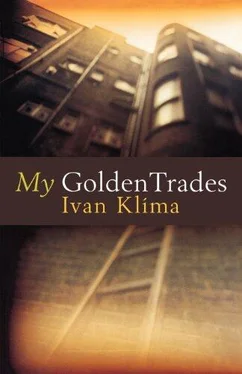Ivan Klima - My Golden Trades
Здесь есть возможность читать онлайн «Ivan Klima - My Golden Trades» весь текст электронной книги совершенно бесплатно (целиком полную версию без сокращений). В некоторых случаях можно слушать аудио, скачать через торрент в формате fb2 и присутствует краткое содержание. Год выпуска: 1998, Издательство: Granta UK, Жанр: Современная проза, на английском языке. Описание произведения, (предисловие) а так же отзывы посетителей доступны на портале библиотеки ЛибКат.
- Название:My Golden Trades
- Автор:
- Издательство:Granta UK
- Жанр:
- Год:1998
- ISBN:нет данных
- Рейтинг книги:4 / 5. Голосов: 1
-
Избранное:Добавить в избранное
- Отзывы:
-
Ваша оценка:
- 80
- 1
- 2
- 3
- 4
- 5
My Golden Trades: краткое содержание, описание и аннотация
Предлагаем к чтению аннотацию, описание, краткое содержание или предисловие (зависит от того, что написал сам автор книги «My Golden Trades»). Если вы не нашли необходимую информацию о книге — напишите в комментариях, мы постараемся отыскать её.
My Golden Trades — читать онлайн бесплатно полную книгу (весь текст) целиком
Ниже представлен текст книги, разбитый по страницам. Система сохранения места последней прочитанной страницы, позволяет с удобством читать онлайн бесплатно книгу «My Golden Trades», без необходимости каждый раз заново искать на чём Вы остановились. Поставьте закладку, и сможете в любой момент перейти на страницу, на которой закончили чтение.
Интервал:
Закладка:
I looked into a bookstore window, though I knew there'd be nothing interesting on display. Even if, miraculously, something good were to be published, they wouldn't put it in the window; they'd keep it under the counter for their friends. Several men, probably construction workers, were standing outside a pub with half-litre glasses of beer in their hands, spending their working hours in pleasant conversation. The repairs to the façades on the Old Town Square were almost finished, and
the square gleamed with newness and colour like a grand Sacher cake; I liked it, and I got enormous pleasure out of just being able to wander about there. Before I found this job I came downtown twice a month at most, and then I was in a hurry to get back home and back to work. But now this job brought me here every day, and I could study the slow progress of repairs to the Týn Church, and peer into the exhibition room of the Town Hall. I could even have gone in, but felt reluctant to do so, for as long as I was moving through the streets with my pushcart in the general direction of my destination, I was working and no one could complain. But I had no business at an art show.
I stopped in front of the Town Hall tower. The first tourists of the morning were beginning to gather on the pavement below the astronomical clock. Tourists from the West were still asleep or perhaps having breakfast, whereas those standing beside me, already burdened with parcels and waiting for the Twelve Apostles to appear when the clock struck the hour, were a group from the empire of our eastern neighbours. I listened to their soft speech, a language that had seduced some of our reckless and gullible ancestors into dreaming dreams of a brotherhood of the strong and the weak. But the conversation didn't seem to be about anything that made sense.
The clock struck, the apostles paraded one by one past the tiny portals, but as always, they remained silent, telling us nothing and then vanishing into their darkness again.
I walked along Ironmonger's Street to Mustek where, in an antique store, I saw a Renaissance armoire costing 180,000 crowns. Doing the work I was doing now, this was the accumulated salary of ten years. I began to plan the story of a courier who decided not to eat, drink, live
anywhere or even read so he could save all his money to buy this antique armoire. Several endings suggested themselves. The courier, who all that time had slept in a cellar and lived on the leftovers he picked off plates in the stand-up buffets, could die of exhaustion. Or he survives but meanwhile — and this was the most plausible outcome — the armoire is sold to someone else. Or, and this was my favourite: he finally drags himself to the shop, where he finds the armoire still waiting for him, but in the meantime the price has doubled.
Just outside the entrance to the subway, a small poster announced in a brief, pointed verse: 'Hey, hey, hey, our pizza's okay kay kay!' I wasn't hungry, but the pizza was surprisingly cheap and there were only about twenty people in the queue, so I decided to indulge in a snack.
In fact, I have no great desire to own a Renaissance armoire, and I make my living as a courier only during the summer months. I have no complaints about the pay; I understand that in the age of long-distance electronic data transfer, interlocking information systems and telecommunications satellites, my job is as archaic, or as folkloric, as a bagpiper, a Buckingham Palace guardsman or a writer. But I have always had a weakness for archaic jobs, even in times when I could, on the whole, choose freely what I wanted to do. I refused to become an engineer or a physician, although my professors tried to persuade me to do so, and although I had inherited a capacity for mathematical thinking from my father. Some time later I committed my first political transgression (I had written an article in praise of Karel Čapek) and when they threw me out of the editorial department of an illustrated weekly, I was offered a job as editor in a factory that manufactured
aircraft engines. I turned it down, not because I feit it was demeaning to be editing an in-house magazine, but because I didn't trust aircraft engines. Had they offered me a similar position in a factory that made hats or mustard, I would have accepted.
As far as I can, I choose occupations that don't trap me within four walls. When I was an editor, I refused to sit in the office, but instead went out on assignments. Even as a hospital orderly, I spent most of my time rushing between the wards, the pharmacy, the morgue and the labs. Sitting behind a desk, there are no surprises. Outside, there is the possibility of a chance encounter.
I would have liked to work for the post office. People look forward to the postman, since most people, unreasonably, expect good news rather than bad. I used to long to bring people a message of great import. Now I'm more modest, and I'd be satisfied with bringing good news. But the post office didn't want me, so instead I took the job of courier in an institute that tests and evaluates air and water pollution across the country. The thing that interested me most about the institute was that a large number of computer programmers worked for it. I had heard a lot about computers but knew little about them and the people who serve them. I understood enough, however, that I could imagine the future belonging to them.
What will that future be like? I recently read an article, purporting to demonstrate that the interpersonal relationships of computer programmers suffer because of their constant contact with the computer. It used to be, the author went on to say, that a person could carry on a conversation only with another person. There was no other choice if he wanted to talk or to make love, even though
that other person might, at times, have seemed dull and stupid, or even deceitful.
But now you can have a conversation with a computer; a computer not only understands, but replies. Moreover, you know the computer will not deceive you, or leave you; it will always be there, and may even outlive you. Soon, the article argued, you will be able to sit down in front of a friend of the sixth generation or so and converse with it wisely, as you could do with no human being. Can you love a computer, too? If the operator asks that question at all, the author suspects that yes, he will love it and, moreover, the computer will love him back. Who else could they love without being unfaithful?
It was a variation on the theme of robots, our future masters. It was neither inspiring nor, fortunately, very believable.
Because the results of the institute's work, important though they were, produced nothing but public concern, it did not enjoy official favour. It did not even have its own building. Its employees worked at two sites at opposite ends of the city. And, though a quarter of its employees were programmers, the institute had had its only mainframe computer confiscated, so the programmers had to travel to three other locations where they could get an hour or two of computer time to process their information on the state of our environment.
Because data transmission was something you can only read about in this country, the need for a courier became obvious. His — my — job was to deliver from one workplace to another everything that needed delivering. Sometimes it was just the newsletter, at other times a box of diskettes, bundles of punch cards or reams of computer print-outs.
Often there was nothing at all or, like today, flowers. In such cases, I would sit for a while in the modern hall of the institute in the Southern City — an enormous complex of high-rise apartments — and read a book, or study the WordPerfect manual that Engineer Klíma pressed upon me with the injunction that I must not leave the institute without some useful insight into the things a computer can do. In any case, he claimed, this knowledge would certainly be useful in my own profession.
Читать дальшеИнтервал:
Закладка:
Похожие книги на «My Golden Trades»
Представляем Вашему вниманию похожие книги на «My Golden Trades» списком для выбора. Мы отобрали схожую по названию и смыслу литературу в надежде предоставить читателям больше вариантов отыскать новые, интересные, ещё непрочитанные произведения.
Обсуждение, отзывы о книге «My Golden Trades» и просто собственные мнения читателей. Оставьте ваши комментарии, напишите, что Вы думаете о произведении, его смысле или главных героях. Укажите что конкретно понравилось, а что нет, и почему Вы так считаете.












